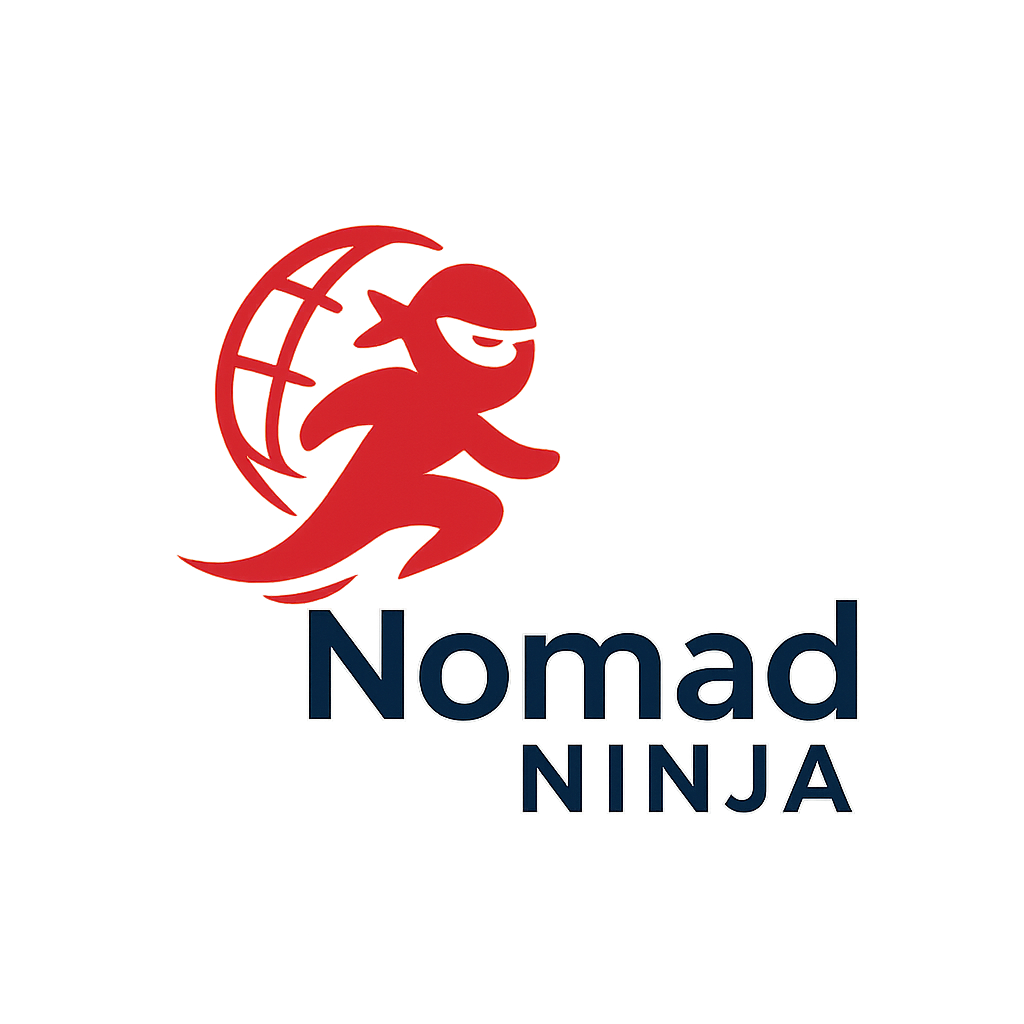This post contains affiliate links and I may earn commissions if you make a purchase.
Digital nomadism is more than just a trend; it’s a lifestyle choice that many people are embracing in today’s interconnected world. Imagine combining the freedom to explore different cultures and places with a stable income. That’s what being a digital nomad is all about.
Living as a digital nomad offers plenty of benefits, the biggest being the freedom to choose where you live and work. Picture waking up to the sound of ocean waves one month and finding yourself in a bustling cityscape the next. With just a good internet connection and your trusty laptop, the world really becomes your workplace.
However, like any lifestyle, it’s not without its challenges as I’ve mentioned in many articles already. You have to juggle work commitments and the allure of new places. Staying disciplined and managing your time efficiently are crucial skills to have. Besides, traveling continuously can lead to feelings of isolation or homesickness.
Flexibility and adaptability become your best friends in this lifestyle. Flights get delayed, plans change, and sometimes, the Wi-Fi just won’t cooperate. But if you can roll with the punches, the freedom you get in return can be incredibly rewarding.
Being a digital nomad requires a shift in mindset where you learn to prioritize experiences over possessions. It’s about finding that sweet spot between work and leisure. If you’re prepared to adapt and grow, digital nomadism can be an enriching and liberating way to live. It’s not just about where you go, but aspiring to create a lifestyle that fits your personal and professional goals perfectly.

Common Digital Nomad Jobs
Freelance Writing is one of the go-to jobs for many digital nomads. If you have a way with words, you can start with small gigs and build up your portfolio. Platforms like Upwork and Fiverr are great for finding your first gig. The flexibility is fantastic, but you need to be self-disciplined to meet deadlines consistently. Salaries can vary widely—expect anywhere from $10 to $100 per article, depending on complexity and your experience.

Web Development offers a stable income and high demand. If you have a background in coding, diving into web development can be quite lucrative. This field requires strong technical skills, and platforms like LinkedIn and Indeed frequently list remote job openings. Salaries range from $40,000 to over $100,000 annually, making it a solid choice. Continuous learning is key; you might want to check out courses on Alison.com to brush up on new tech skills.
Online Tutoring taps into the growing field of online education. Whether you’re teaching English or explaining mathematics, this job is in high demand. Websites like VIPKid and Tutor.com offer platforms to connect with students worldwide. It’s rewarding and pays decently too, with rates from $15 to $30 an hour. You’ll need good communication skills and a stable internet connection. Certification can help boost your credibility and earnings.
Uncommon Digital Nomad Jobs
Virtual Reality Tour Guide is a unique opportunity for those with a flair for storytelling and a love for travel. As VR technology advances, more travelers seek immersive experiences from the comfort of their homes. Your role would be to craft engaging tours using virtual reality tools. Experience in tourism and tech support is beneficial. Opportunities can be found on platforms like VeeR Experience. Earnings range widely based on project size and complexity, so immerse yourself in learning the tech side with resources like Alison.com.
Podcast Producer combines creativity and technical skills, appealing to those who enjoy creating content and communicating ideas. While competition is growing, there’s still plenty of room in the podcasting space. The typical path involves starting your own show or producing for others. Websites like PodJobs host listings. Expect to earn from $20 to $50 per hour, and know that networking is crucial in this field.

Remote Event Planner might involve organizing anything from corporate meetings to virtual parties across time zones. Attention to detail and strong organizational skills are key here. Many companies look for part-time assistance on job boards like Remote.co. Salaries usually range from $30,000 to $70,000 annually, depending on experience and the scale of events you manage. Training in event management can be helpful, and online resources, including Alison.com, can kickstart your learning journey.
How to Secure a Digital Nomad Job
Building a strong portfolio is crucial when aiming to land a digital nomad job. Your portfolio acts as proof of your skills and experience, providing potential employers or clients with a glimpse of what you can offer. Whether you’re into writing, coding, or event planning, tailor your portfolio to highlight your best work, and keep it updated regularly.
Several websites specialize in remote job listings, making them invaluable resources for digital nomads. Sites like Upwork, Remote.co, and We Work Remotely list numerous opportunities across various fields. Navigating these platforms takes practice, but being proactive and responsive can help you stand out.
Nailing the interview stage requires some specific strategies. Unlike traditional face-to-face interviews, remote job interviews might require you to focus more on your ability to work independently and communicate effectively through digital channels. Practicing with a friend or reciting potential questions can ease nerves and help convey your dedication and professionalism.
Networking can significantly enhance your job prospects as a digital nomad. Engaging with online communities or attending virtual networking events can open doors to opportunities you wouldn’t find elsewhere. Establishing connections with individuals in your preferred field can lead to insights, referrals, and collaborations.

Lastly, do your research on each job role you’re interested in. Understanding what skills are in demand and which ones can set you apart is essential when applying. It shows initiative and a genuine interest in the field, qualities that employers value highly.
Skill Development and Training
Staying competitive in the digital nomad world requires continuous learning and skill development. Technology and industry trends evolve rapidly, making it vital to keep your skills sharp and relevant.
Online courses offer an accessible way to learn new skills no matter where you are. Platforms like Alison.com provide various free and affordable courses in areas like web development, writing, business management, and more. Taking advantage of these resources can enhance your expertise and boost your resume.
Prioritize learning skills that complement your current expertise. If you’re a writer, for instance, understanding SEO can increase your marketability. Similarly, web developers could benefit from learning the latest coding languages or design tools.
Learning doesn’t have to be all about work-related skills. Picking up a new language or cultural insights can be incredibly useful when traveling. They enrich your personal growth and enhance your ability to connect with different communities.
Networking with other digital nomads can also be a valuable learning experience. Interacting with them through online forums or meetups can provide insights into new tools, resources, and strategies.
Remember, making time for skill enhancement is key to thriving in the digital nomad lifestyle. Setting aside even just a few hours a week for a course or self-study can keep you ahead of the curve.
Pros and Cons of Digital Nomad Jobs
Digital nomad jobs come with their set of advantages that can be quite enticing. The primary upside for most is the freedom to choose where and when to work. This flexibility allows individuals to tailor their work environment to boost creativity and productivity.
On the flip side, this freedom can sometimes lead to a lack of structure, making time management a critical skill. Without the framework of a traditional job, staying focused and maintaining a steady workflow can be challenging.
Specific job roles come with their own pros and cons. For instance, freelance writing offers incredible flexibility and the chance to explore diverse topics, but it may also mean inconsistent income and the need to constantly seek new clients.
Web development is another popular choice, providing high earning potential and consistent demand. However, it requires keeping up with rapid changes in technology and can be quite demanding in terms of time and mental energy.
Online tutoring is rewarding and offers stable income, but adjusting to different time zones across the globe can impact personal time, and breaking into the field might require initial effort to build a solid reputation.
To find a balance, it’s often helpful to establish a routine that includes dedicated work hours and break times. Setting boundaries ensures that you’re neither overworking nor getting too relaxed. This approach not only helps you stay productive but also lets you enjoy the benefits of the digital nomad lifestyle.

Salary Expectations and Rating
Navigating salary expectations as a digital nomad can be a bit of a rollercoaster because no two roles offer the same earning potential. However, having a realistic understanding of possible income ranges helps manage expectations and plan your financial future.
Starting with freelance writing, the income can vary significantly. Beginners might earn anywhere from $10 to $20 per article, while seasoned writers working with reputable clients could see their rates soar to $100 or more per piece. This variability depends largely on your niche, experience, and negotiation skills.
Web developers generally enjoy a more stable income compared to other digital nomad roles. Depending on expertise and project complexity, salaries can range from $40,000 to over $100,000 annually, making it one of the more lucrative paths. Those skilled in cutting-edge technologies or highly sought-after platforms generally command higher rates.
Online tutoring can yield a consistent income stream. Tutors often earn between $15 to $30 an hour, with the potential for more as they gain experience or specialize in high-demand subjects. It’s an appealing option for teachers looking to transition into remote work without a massive pay cut.
When considering uncommon roles like a Podcast producer or Remote event planner, salaries can also vary. Podcast producers might make between $20 to $50 per hour, while remote event planners have salaries ranging widely based on event scale and complexity, typically between $30,000 to $70,000 annually.
Ultimately, salary is just one factor in choosing the right digital nomad job. I’ve noticed that balancing income potential with personal satisfaction and lifestyle compatibility often leads to a more rewarding remote career. Rating jobs on a scale like income potential, flexibility, and personal interest can provide clarity on what suits you best.

Remember, navigating this world is also about growth, and sometimes taking a less-paying job to gain valuable experience may pay off in the long run.
Conclusion and Future of Digital Nomadism
The future of digital nomadism looks promising, bolstered by advancements in technology and the changing dynamics of work cultures. Remote work has found greater acceptance across industries, making this way of life more attainable for many.
Emerging trends suggest more companies are looking into flexible work arrangements, providing opportunities not just in traditional roles but in innovative fields too. This means that digital nomads can expect a growing variety of job opportunities in the coming years.
Environmental awareness and sustainable travel are gaining traction among digital nomads, leading to a more deliberate and responsible approach to living and working across different locales. This cultural shift is contributing to a positive perception of the digital nomad lifestyle.
Encouragingly, more support networks and tools are becoming available, ranging from co-living spaces tailored for digital nomads to online platforms that facilitate professional connections. These resources make it easier for nomads to maintain a work-life balance and foster a sense of community.
For those aspiring to dive into the digital nomad lifestyle, remaining open to change and adopting a mindset of continuous learning is crucial. Opportunities abound for those willing to adapt and embrace the global work landscape with enthusiasm and innovation.
The digital nomad journey is one of self-discovery and growth, offering the chance to redefine what work means on a personal level. As you explore this path, remember that it’s about crafting a lifestyle that aligns with both your professional aspirations and personal values.
NN





Leave a Reply